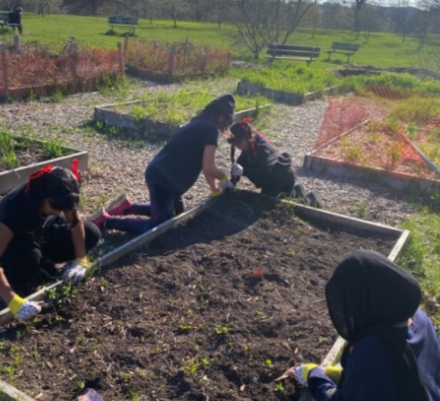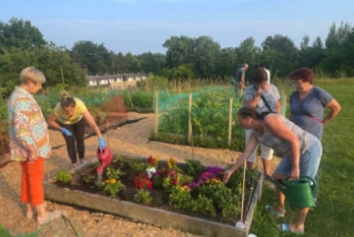HARVESTING CONNECTIONS: Gardening projects coincide with region’s growth spurt
Social infrastructure is on the table as Waterloo Region prepares to grow to more than one million people.
Waterloo Region Community Foundation(WRCF) defines social infrastructure as “the system of organizations, spaces and experiences that enable people to connect with each other, the bridges necessary to build trust and civic participation, to create a sense of belonging and wellbeing. It’s the system that enables sustainable widespread community development.”
If physical infrastructure can be defined by bricks and mortar — housing, parks, roads, public transit, recreation centres, sewers, and power grids — social infrastructure is the human connection point. The reason for the physical infrastructure and/or the way to connect the way to connect to it.
A pent-up demand for community connection was revealed during WRCF’s 2024 On the Table Waterloo Region initiative which brought together 1,300 residents through 54 events across the region for open discussions between friends, neighbours, co-workers, and fellow community members.
Themes that emerged from those talks included creating and maintaining thriving neighbourhoods, ensuring equitable access to social infrastructure, and harnessing community assets and celebrating what is already here.
Social infrastructure is WRCF’s strategic area of focus through 2027, coinciding at a time of unexpected growth and increased diversity in Waterloo Region.
The journey toward sustainable widespread community development won’t be a straight line, but many of the building blocks are already in place. One strong example of social infrastructure is community gardening, which reinforces traits such as connection and collaboration for all ages and abilities in a safe and accessible setting.
Social infrastructure, like gardening, requires diligence and intention, but the fruits of these labours are already revealing themselves. Here are four examples of community gardens that have sprouted up in our region:
Kinbridge Community Association – Christopher Champlain Cultivating Garden
For some, it has served as a lifeline out of isolation. For others, it has been a place to discover a sense of accomplishment.
Whatever the benefits, it has been two green thumbs up for all involved in the new gardening programs offered by Kinbridge Community Association at its Christopher Champlain Cultivating Garden.
Kinbridge is a grassroots association providing programs and initiatives that address the needs of the whole family in the South Galt neighbourhoods of Christopher Champlain and Southwood, which includes more than 34,000 residents.
Gardening opportunities had previously been offered by Kinbridge, but not to this extent. Thanks to financial assistance from the Waterloo Region International Plowing Match 1995 and 2012 Fund held at WRCF, Kinbridge was able to effectively replace its decaying garden structures with new, more accessible garden spaces, while also purchasing the required soil and equipment, including a new rain barrel.
Those improvements paved the way for two new programs, the first being the adult newcomer garden program, followed by the Garden-to-Plate Club for kids. Both sprung up in spring 2024.
The newcomer program saw 25 new residents find new connections and camaraderie while growing vegetables, flowers, and herbs. They enjoyed physical and mental health benefits as well as a place to engage with others and form meaningful relationships.
“I hadn’t had the chance to garden since I left my home country many years ago. Being able to dig my hands into the soil and watch the plants grow reminded me of my family’s farm back home. This program helped me feel connected to my roots and to my community here.”
The Garden-to-Plate program was actually initialized by kids in the neighbourhood who showed interest in learning to plant and harvest food and then preparing it. The program emphasized safe cooking techniques, hygiene, and nutrition.
“It wasn’t just about the gardening aspect and taking care of it. It ended up turning into learning about kitchen safety as well. How to prepare meals safely... nutrition and food prepping and washing hands and all of the things that come with preparing meals,” said J’aime McLeod, Manager of Community Development at Kinbridge. “It was a really phenomenal opportunity for the kids.”
“And for our seniors, I can’t emphasize enough how much that gardening program has impacted their willingness to be part of other programming, and the friendships and social connections they’ve made,” she added.
It all came full-circle in some instances, such as when eggplants grown by those in the newcomers program was given to the kids in the Garden-to-Plate program, who then prepared and enjoyed eggplant parmesan using their newly developed skill sets.
For more information about the Kinbridge Community Association, visit their website at kinbridge.ca.
Kitchener-Waterloo Art Gallery — 50/50 Garden of Resilience
What is currently just a patch of unused grass with negative environmental impacts will soon become an active symbol of hope for a more sustainable planet.
The Kitchener-Waterloo Art Gallery (KWAG)’s 50/50 Garden of Resilience is a tangible result of the public gallery’s three-part exhibition titled SOS: A Story of Survival.
That series asks big questions about what survival is, what it means to survive, what is propelling survival and what is threatening it. The exhibition doesn’t pretend to offer solutions to systemic issues like global warming, Darryn Doull, Curator: Exhibitions & Programs at KWAG, explained. Rather, it highlights some tools and strategies for exchange, for coming together, for forming community at a more local level and moving away from a globalist mindset.
Ron Benner, Trans/mission: 101, 2017 (2013). Photographic and garden installation on view at KWAG from 17 May to 30 September 2017. Photo courtesy of KWAG, by Scott Lee.
The gallery’s new on-site garden, slated to open in Spring 2025, will be an extension of this thinking.
The garden will be a site for community members to grow organic vegetables, fruits, herbs and flowers to be consumed by the gardeners and redirected back into the community. It will also serve as a model for de-centering decision-making from the bureaucracy of the institution, Doull said, focusing instead on learning from the land and the seasons while flattening the “hierarchy of knowledge.” Thirdly, the garden will be a gallery. A ‘Gardener-in-Residence’ program will see local artists paid to complete activations throughout the year while also keeping a plot in the garden for themselves. These intergenerational workshops, lectures, performances and concerts will all keep food security and ecological sustainability at their core.
The project received funding from WRCF’s Community Grants program and from the TD Friends of the Environment Foundation to pay for the required infrastructure, equipment, soil, basic tools, and a supply shed.
For this project, KWAG has consulted with Dave Skene, an urban Métis farmer with Wisahkotewinowak, an urban Indigenous garden collective. The partnership hopes to offer sustainability-themed programming for youth groups in a relationship of reciprocity.
The 50/50 Garden of Resilience is an ambitious project that will turn a barren patch of grass with non-native species that was being manicured with gas-powered equipment into a place of learning and experiencing.
"This garden isn’t going to solve the issue of food insecurity in the region. And it’s not pretending to. But as a tool, as a site for coming together, the things that we learn and explore and experience together in the Garden of Resilience are tools that people can take and do at their own home,” Doull said. “Maybe somebody doesn’t participate in the garden, maybe they don’t have a plot at the gallery, but maybe they come to some of the workshops, some of the things that we do to activate the garden over the course of the year, and there’s value in that. It incrementally makes our community more resilient amidst uncertain times.”
Doull added: “Just as much as we’re harvesting food from the ground, we’re really nurturing and growing that knowledge base for people to take these ideas of urban farming, of just how easy it can be to grow some food at home and take that home and let that blossom.”
KWAG will be putting out more information about their 50/50 Garden of Resilience and hosting community sessions in the coming months along with establishing a committee to ensure direct community involvement. For more information about KWAG, visit kwag.ca.
Muslim Social Services Waterloo Region — Mindful Gardening Project
Food security, community building, cultural understanding, and mental health are the focal points of Muslim Social Services Waterloo Region’s Mindful Gardening Project.
Started last April in collaboration with Wisahkotewinowak, the project includes weekly planting workshops led by master gardeners on site at 466 Queen Street South in Kitchener.
Wisahkotewinowak and Crow Shield Lodge helped facilitate access to the land, and shortly after a community garden sprung up with about 20 participants meeting each Friday. They grow everything from tomatoes, cucumbers, and eggplant to various herbs. A season-ending barbecue drew some 75 people and made use of some of the vegetables grown.
The project aims to help seniors fight isolation while bringing Muslim and Indigenous communities together to promote mindfulness and wellbeing among marginalized communities with shared lived experiences.
“This program transforms my worries into laughter and moments of connection. Conversations flow, smiles brighten the day, and everything around me feels lighter and more hopeful. It’s not just a garden but it’s also a space where positivity thrives and where I feel truly connected, to the land and not only to nature but also to the community around me.”
Connection to the land and nature is at the heart of it all, while storytelling, shared meals, and learning about gardening techniques rounds out the programming. Interest has been so great that a greenhouse has been constructed so community members can participate year-round.
The Mindful Gardening Project, developed mostly for refugees, newcomers and seniors, was supported by WRCF’s Community Grants program, helping with costs associated with tools, seeds, the greenhouse, and program facilitators.
“It is a small garden, but the impact is huge,” said Duaa Al-Aghar, Executive Director of Muslim Social Services Waterloo Region. “This project is not just about gardening. It creates a sense of community building, an opportunity for healing together and learning from each other.”
While there are many layers to the garden project, it all points back to the connections made.
“It is a really unique program that bridges the understanding between different cultures — the Indigenous culture and the Muslim culture. And also a healing practice. We connect the Indigenous communities with the Muslim communities and this is where we came together,” Al-Aghar said. “The program focuses on getting a deep understanding and connection to the land and nature and it helped us learn many gardening techniques from the Indigenous community.”
For more information on Muslim Social Services Waterloo Region and the programs they offer, visit msswr.org.
Seeds of Diversity — Youth in Food Systems
Like the seeds they champion, youth in Waterloo Region are growing their skillsets thanks to Seeds of Diversity’s Youth in Food Systems program.
Seeds of Diversity is a Waterloo-based national organization dedicated to preserving and cultivating heirloom and endangered food crop varieties.
In addition to hosting a seed library of about 3,000 varieties, this 40-year-old seed-saver organization has many ongoing projects and programs including Youth in Food Systems, which creates opportunities for youth to connect with food systems while learning practical skills.
While the program is provincial, its core work happens in Waterloo Region where 47 gardens have been built at schools across the region since 2017. The program has evolved in recent years (sparked by changes brought on by the global COVID-19 pandemic) to provide year-round and seasonal opportunities for high school students. The summertime youth food market is a full-circle approach that includes growing and sourcing produce, advertising and engaging with customers in the Eastwood and Laurentian Hills neighbourhoods. Other projects have centred around seed stewardship, blogs, a social media and interview series, and a garden workshop series bringing youth and adults together to engage in hands-on learning at various sites.
“Our hope is that these programs are really flexible and they allow youth to explore and develop skills that really interest them,” said Youth in Food Systems Program Manager, Andrew Jackson. “The market is an especially great way to see that because there’s such a variety of things that you can do as a part of the market."
About 120 youth across our region tended to school gardens this past year, growing seeds and produce that can be directed back to communities that can benefit from access to fresh, affordable products.
“As the youth move on, we hope that some of the skills and interests they built go on to impact how they approach their careers in the future or how they see food access in their personal lives,” Jackson said. “We hope skills, confidence and abilities are nurtured in this space.”
The Youth in Food Systems program has received support from two funds held at WRCF; the Ontario Endowment for Children and Youth in Recreation Fund and the Waterloo Region International Plowing Match 1995 and 2012 Fund.
“The workshops wouldn’t have been able to happen without that funding,” Jackson shared. “With the support of organizations like WRCF, we can provide a lot more meaningful impact.”
To learn more about Seeds of Diversity, visit their website at seeds.ca.









